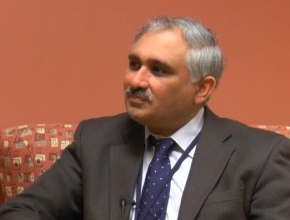Related McMaster Perspective episodes
Nair P, Jaeschke R. The future of medicine is here. Part 1: Benralizumab in asthma.Nair P, Jaeschke R. The future of medicine is here. Part 2: The basics of biologic drugs in asthma.
References
Nair P, Wenzel S, Rabe KF, et al; ZONDA Trial Investigators. Oral Glucocorticoid-Sparing Effect of Benralizumab in Severe Asthma. N Engl J Med. 2017 Jun 22;376(25):2448-2458. doi: 10.1056/NEJMoa1703501. Epub 2017 May 22. PubMed PMID: 28530840.Roman Jaeschke: Maybe 2 questions. One is, how “very” is “very expensive”? And the other one is, were [biologic drugs] compared with some clinical conclusions against more standard treatments for asthma?
Parameswaran Nair: You are talking of about CaD $24,000 to CaD $28,000 per year per patient with any of these biologics. For some of the biologics that are yet to be approved, a speculative cost is over CaD $30,000 per patient per year.
The study that we discussed earlier on benralizumab was performed in the most severe patients who are on daily prednisone in addition to inhaled corticosteroids. For those patients—fortunately, there are very few: the prevalence of prednisone-dependent asthma is estimated to be about 5% to 10% of all asthma—although a formal health technology assessment has not been performed, it is likely that the introduction of these drugs would not only be cost-effective but it would improve the quality of life for patients in whom the quality of life is impaired not so much by their asthma but by the adverse effects of corticosteroids, by prednisone, systemic corticosteroids.
In those patients who have milder asthma or moderate asthma on inhaled corticosteroids, your point is very well taken. Most of the clinical trials have compared the addition of the biologics against placebo, and in most of these clinical trials there has been a huge placebo response. In other words, just by getting into the clinical trial, where the patients’ compliance with what they are supposed to be taking improves, their asthma control improves. This has been a problem. In my opinion, it has been a defect, a fault with all these clinical trials, because they have been done in regions where patients’ compliance has not been emphasized and the standard of care has not been enforced before recruiting them into clinical trials.
Roman Jaeschke: So what you are saying is that by virtue of joining the trials, they had to start using standard therapy for asthma and their clinical status markedly improved just because of that?
Parameswaran Nair: Exactly. The standard of treatment, compliance, and the availability of medications improves by getting into a clinical trial, because in most of these clinical trials the sponsor provides the basic maintenance inhaler therapy, thereby improving asthma control.
 English
English
 Español
Español
 українська
українська








